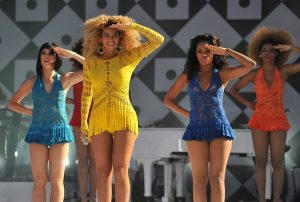The summer music festival season is in full swing. This weekend, an American pop icon, Lionel Richie, stole the show at England’s Glastonbury Music Festival from hip hop sensation Kanye West. Richie attracted an estimated 100,000 people for his set over the weekend, the BBC reports, while West’s performance drew mixed reviews.
Music festivals also have a long and colorful history across the United States, led by the Woodstock, N.Y., Music and Arts festival during the summer of 1969, which spawned books, movies and countless recordings.
And while streaming sites like Spotify and illegal downloads have deflated album sales in recent years, they’ve also helped drive the reemergence of the summer festival.
Many fans, and Millennials especially, are willing to spend a lot of money to camp, party and experience several days worth of concerts from a variety of artists. The demand has helped build mega-festivals in different parts of the country.
Coachella in Indio, Calif., which kicked off the festival season in April, is one of the biggest success stories. Despite financial problems in the early 2000s, it was the most industry’s most profitable festival in 2013, selling 158,000 tickets in 20 minutes and pulling in an incredible $47.3 million in revenue, according to the Huffington Post.
The wealth has spread across the country as well. Bonnaroo, held earlier this month in Manchester, Tenn., sold all of its basic $269 tickets and offered VIP packages to its young audience for a pricey $1,449.50.
These events are not just lucrative for organizers. They’re proving to be lucrative for cities as well.
Coachella and the country-music based Stagecoach festival brought 3,000 temporary jobs and $254 million into the local economy in 2012. Local businesses prepare for the festivals weeks in advance as more than 80,000 people come to the event each day.
Other festivals have evolved beyond just music and feature larger attractions that draw different interests.
South by Southwest (SXSW) in Austin, Texas, throws film and technology into the mix, bringing in crowds of fans, executives, producers and founders of tech startups for nearly two weeks each March. The local economy earned around $218 million in 2013 during the festival, Governing magazine reports.
Not everyone is particularly excited about the crime and safety concerns that come with these events or the thousands of people overcrowding an area, however.
That’s especially true in Chicago, which hosts a major festival almost every weekend during the summer and into the fall. Some residents in the Humbodlt Park neighborhood have protested holding Riot Fest there this September, saying past crowds have damaged the park and caused a ruckus.
Lollapolooza, another big festival, has experienced tension with Loop residents because of its big crowds, but its organizers have tried to win over the locals.
Promoter Charlie Jones told Crain’s Chicago Business that 2013 was the first year he felt that politicians and nearby residents actually “embraced” the event. One benefit: the $20 million Lollapolooza pays in taxes and liquor taxes to city and state governments, under a deal that keeps it in Grant Park through 2021.
Promoters in Deleware expect three musical festivals this year to pump upwards of $100 million into the local economy, but some business owners interviewed by The News Journal said festivals haven’t helped their sales in the past. Others said that the increased traffic in the area actually keeps people away, causing a drop in business.
Whatever the case, music festivals continue to be popular summer staples and offer a great opportunity for reporting on money.
For story ideas, look at the local economic impact of any music festivals in your area. Festivals aren’t just a big city thing, so make sure to find out if there are any happening near you.
You can also find out if any local music fans are heading to one of the many large festivals across the country this summer. How much are they spending to travel and what are some of their spending habits when they’re there?
STORY IDEAS










